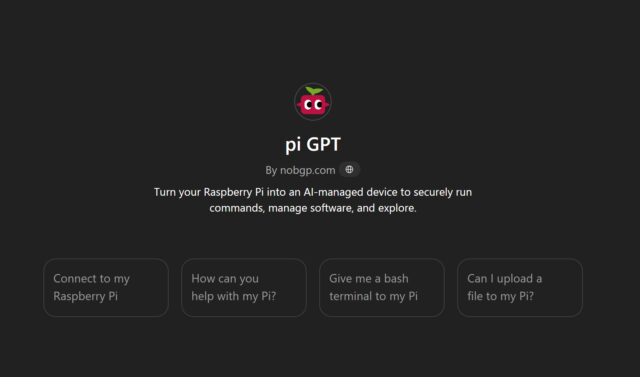pi GPT turns your Raspberry Pi into an AI-managed device

Anyone creating projects on a Raspberry Pi can now link their devices directly to ChatGPT via a new tool from noBGP called pi GPT. The integration lets users vibe code, build and manage software on their own devices without relying on cloud services.
Instead of preparing network settings, handling ports, or moving between multiple consoles, pi GPT users can work inside ChatGPT and direct tasks to a Raspberry Pi on a desk or in a workshop. The platform connects Pi devices through noBGP’s deterministic networking system, which delivers consistent routing, private links, and predictable behavior across different environments.
SEE ALSO: Raspberry Pi 500+ all-in-one PC debuts for $200 with mechanical keyboard
pi GPT essentially turns the Raspberry Pi into a development or production target that responds to ordinary prompts. A user can ask ChatGPT to open a service, review an application’s status, update code, or deploy a small web tool.
Everything goes through noBGP’s private connectivity layer, which is built to remove the need for VPNs, port forwarding rules, or firewall adjustments. The goal is to keep the setup as close as possible to a plug in and begin experience.
Many early adopters of vibe coding relied on cloud machines because of their simplicity. pi GPT shifts part of that work back to local hardware, supporting developers who prefer to experiment on physical devices. It should also appeal to classrooms, hobbyists, and students who see Raspberry Pi as a low cost entry point into computing.
pi GPT goes beyond Pi
Despite its name, pi GPT isn't limited to use on the Raspberry Pi, it also works with Linux based hardware such as Nvidia Spark and Nvidia Jetson. Those systems can sit alongside cloud instances, allowing a project to span local boards, edge devices, and online servers while keeping the same network behavior.
“pi GPT makes vibe coding truly accessible; no cloud bills, no setup headaches. Developers can just code and create instantly,” said Ryo Koyama, noBGP Founder and CEO. “For millions of developers, builders, and students, Raspberry Pi is where ideas start. Now, pi GPT can help those ideas grow into production-ready apps. This is the next phase of vibe coding that is accessible, frictionless, and fun.”
To learn more about pi GPT and sign up for early access, go here.
What do you think about pi GPT and local vibe coding? Let us know in the comments.
